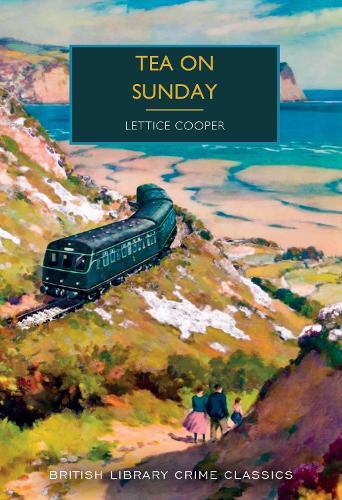Tea On Sunday

A review of Tea on Sunday by Lettice Cooper – 241228
One of the many delights of the excellent British Library Crime Classics series is that it throws up the occasional oddity and Lettice Cooper’s Tea on Sunday certainly fits into that category. An accomplished and established novelist and critic, Cooper, at the grand old age of seventy-six, suddenly had a fit in her head to write a murder mystery. Originally published in 1973 it was her only attempt at the genre and it is easy to see why.
The murder victim is Alberta Mansbridge, a woman of fixed views and with a philanthropic streak, willing to take under her wings old lags in the hopes that they will go straight, an up and coming Italian engineer, and to continue the legacy of her father, the industrialist Albert Mansbridge in whose thrall she lives, by maintaining an orphanage. She invites eight guests to tea on one Sunday, but before all the guests arrive someone arrives early, is let in and strangles her.
The guests, assembled on the doorstep, try to arouse Alberta’s attention but then decide to call the police, at which point Sadler, the ex-criminal, legs it, and entry is forced and the gruesome discovery of their putative host’s body is made. The rather genial and amiable Inspector Corby is given the task of reconstructing Alberta’s last moments and discovering the culprit. His working assumption is that as there was no sign of forcible entry the murderer was known to Alberta and was, like as not, one of the invitees to the soiree. Alberta seemed to be in the process of writing a cheque when she was strangled.
Although a bit of a leap of faith, Corby’s assumption is not unreasonable as his investigations reveal that there are several of the guests who had reason to fear, if not actively dislike their host. A bitter quarrel between two old friends, a spot of peculation with the funds of a cause Alberta holds dear to fund a mistress, a touch of bigamy, a stumbling block to a welcome takeover, a protégé who is not who he claims to be, an allegedly reformed criminal who is going back to his old ways and, inevitably, an impecunious heir who would benefit from his aunt’s death give motive enough. Some of the guests fall by the wayside not all.
To the surprise of his colleagues Corby decides to visit to Alberta’s home town Hithamroyd, convinced that the truth lies somewhere there. Of course, he is not mistaken. While the culprit is fairly obvious and Cooper resists the temptation to throw a curve ball by introducing an outsider to the closed group of suspects, there is much to enjoy in the novel. Cooper takes care in her characterisations. The guests are more than ciphers, just there to aid the plot. We get the opportunity to understand them, particularly the nephew, Anthony Seldon, unwilling to join the family firm to his aunt’s dismay and trapped in a difficult marriage to Lisa, whom Alberta despises. Cooper also draws on her knowledge of the ways of Yorkshire and its countryside to good effect.
By no means a classic in the conventional sense, it is nonetheless an interesting, satisfying, and enjoyable read. It also demonstrates that writing compelling and convincing detective fiction requires a little more than the skillset of a mainstream novelist. It reads as if Cooper had set herself a challenge to write a murder mystery and once completed, she went back to her bread and butter. British Library Crime Classics at least have rescued it from obscurity and we should be grateful for that.



